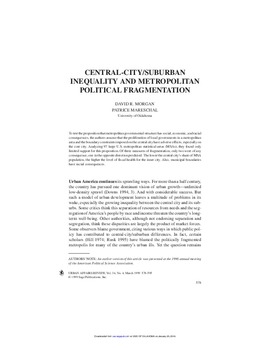| dc.contributor.author | David R. Morgan | |
| dc.contributor.author | Patrice Mareschal | |
| dc.date.accessioned | 2016-01-14T19:53:36Z | |
| dc.date.accessioned | 2016-03-30T15:30:57Z | |
| dc.date.available | 2016-01-14T19:53:36Z | |
| dc.date.available | 2016-03-30T15:30:57Z | |
| dc.date.issued | 1999-03-01 | |
| dc.identifier.citation | Morgan, D. R., & Mareschal, P. (1999). Central-City/Suburban Inequality and Metropolitan Political Fragmentation. Urban Affairs Review, 34(4), 578-595. doi: 10.1177/107808749903400403 | en_US |
| dc.identifier.uri | https://hdl.handle.net/11244/25344 | |
| dc.description.abstract | To test the proposition that metropolitan governmental structure has social, economic, and racial consequences, the authors assume that the proliferation of local governments in a metropolitan area and the boundary constraints imposed on the central city have adverse effects, especially on the core city. Analyzing 97 large U.S. metropolitan statistical areas (MSAs), they found only limited support for this proposition. Of three measures of fragmentation, only two were of any consequence, one in the opposite direction predicted. The lower the central city’s share of MSA population, the higher the level of fiscal health for the inner city. Also, municipal boundaries have racial consequences. | en_US |
| dc.language.iso | en_US | en_US |
| dc.publisher | Urban Affairs Review | |
| dc.title | Central-City/Suburban Inequality and Metropolitan Political Fragmentation | en_US |
| dc.type | Research Article | en_US |
| dc.description.peerreview | Yes | en_US |
| dc.description.peerreviewnotes | https://us.sagepub.com/en-us/nam/manuscript-submission-guidelines | en_US |
| dc.identifier.doi | 10.1177/107808749903400403 | en_US |
| dc.rights.requestable | false | en_US |
